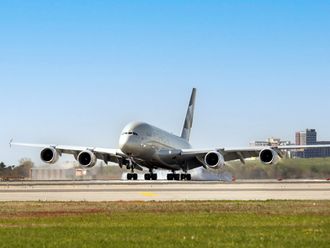LONDON
Major disruption to flights between Britain and the European Union from March 2019 is looking increasingly likely as Brexit talks proceed, Ryanair Chief Executive Michael O’Leary warned on Wednesday.
Airlines say they would need a new deal to replace the current “Open Skies” arrangement by September or October next year to be able to provide scheduled flights in the months after Britain leaves the EU.
But O’Leary said initial signs from Brexit talks were not promising and that likely EU demands for any new deal — including oversight by the European Court of Justice — would likely be unpalatable to London.
“It’s odds against a deal being done in advance of Christmas 2018, because it is in the Europeans’ interest to not have a deal done ... and all hell will be kicking off over here in the UK,” O’Leary told journalists at a briefing in London.
O’Leary was speaking after talks with British Transport Secretary Chris Grayling, which he described as “a very good meeting”. O’Leary said Grayling was increasingly conscious of the need to conclude an aviation deal before the end of 2018.
However, he said did not share Grayling’s optimism that a deal would be straightforward.
“We believe the French and the German airlines in particular are actively negotiating against any favourable deal,” O’Leary said.
O’Leary has been warning since January that a failure by London and Brussels to agree a new bilateral aviation deal by late 2018 could lead to a total freeze on flights between Britain and the European Union.
He said that without a deal on aviation, Ryanair would move dozens of planes currently in Britain to bases in other EU countries to continue flying.
Britain formally began negotiations to leave the European Union in June, but little progress has been made towards an agreement on issues such as citizens’ rights, which are first on the agenda before sectoral issues like aviation are discussed.
O’Leary, an outspoken critic of the British decision to leave the European Union, has warned of the uncertainties caused by the vote ever since the referendum in June 2016, and said that a deal looked no more likely now than it did then.
“We’re 12 months down the road, and we’re no closer to an agreement,” O’Leary said.












